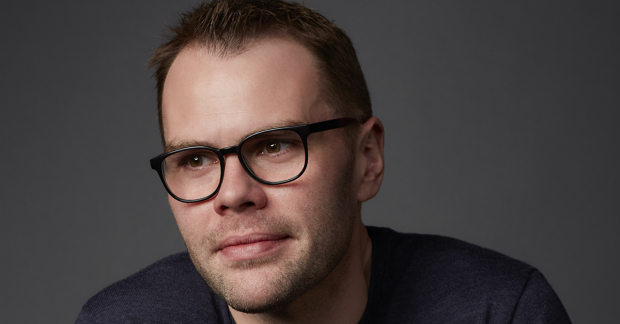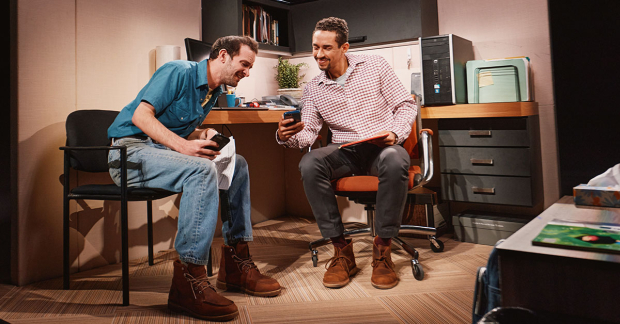Interview: Samuel D. Hunter on Fatherhood, the American Struggle, and His New Play
Hunter’s ”A Case for the Existence of God” for Signature Theatre is directed by David Cromer.
Two men sit in a dimly lit cubicle. One is a gay, Black mortgage broker trying to adopt the baby he's been fostering. The other is a straight, white single father trying to get a loan to buy a plot of land that he thinks will give him a place in the world.
They are the protagonists of Samuel D. Hunter's A Case for the Existence of God at the Pershing Square Signature Center, a devastating but empathetic play directed by David Cromer and starring Will Brill and Kyle Beltran.
Beyond the lofty (and open to interpretation) title, Hunter's latest piece was loosely inspired by his and his husband's dual efforts to buy their apartment and adopt their daughter, now in pre-school. But it's not their story — it's the story of the middle-class American struggle to conform to systems not designed for them. Here, Hunter tells us about this big-hearted work.

(© Gregory Costanzo)
This conversation has been condensed and edited for clarity.
The play is called A Case for the Existence of God. That riled up many of our social media commentors.
It's funny, people have some really wild reactions to that title. I mean, I knew it was a big swing, but I didn't know how provocative it was going to be for some people. It's made people angry, which is so fascinating.
It was interesting reading the recent American Theater interview with you, which comes at it from somewhat of a religious angle, but I'm looking at it from the perspective of, like I said in my review, the miracle of parenthood. Was this play born out of your and your husband's fatherhood experiences?
None of it is autobiographical, but it was really two things: We adopted our daughter and we bought this apartment at the same time. Even when it's relatively smooth, adoption is complex and overwhelming, and buying this apartment was incredibly hard. It took a year for us to close. It felt like this weird part-time job that we had just trying to get this loan, and we were adopting in the middle of that, so our lives were crazier than they had ever been to do two things which are pretty middle-class concerns and that shouldn't be Herculean efforts.
We're artists, so when we're applying for a loan, they're like, "Where are your pay stubs?" so you have to explain how it is that you make money, and then they're like, "Well, what's your salary?" This is not a system that is set up for artists. And then, as two men trying to adopt a baby, it's also not a system that's set up for us. So, we were kind of shoving ourselves into these systems that weren't designed for us, and that's what I wanted to reflect on in the play: these two guys who are meshed in these very complicated, Byzantine systems to do very middle-class, American things.
In that respect, this play is a heartbreaker. All of your plays are heartbreakers…No offense.
[laughs] It's funny, I don't set out to do that, but these are the stories and people who inspired me and that I'm concerned with. I never loved the hero narrative, which is just never something that happens in real life. In most of real life, suffering is just there, right? It doesn't lead to victory. It doesn't lead to success. There's no golden chalice at the end. Most of the time, it's just struggle.

(© Emilio Madrid)
And I sort of knew where it was going to go, and I just so didn't want it to go there, which is the beauty of Will Brill and Kyle Beltran, and how involved I was in their performances. And then I read the digital program and realized they were college roommates, which makes sense given how thick their bond is in the play.
We didn't know that when we cast them. It's an amazing story. Cromer had a relationship with Will, who he met through Our Town, and then he asked Will if he could audition for Tribes, and Cromer tells this story of how Will auditioned for Tribes nine times and hit it out of the park nine times.
Right before the pandemic, we got a reading together and Will was amazing. The pandemic hit, and my friend Peter Mark Kendall was doing Zoom play readings and I wanted to hear it out loud, so they gave it to Kyle and Adam Chanler-Berat, and they were both amazing, but there was something about Kyle in the role that was really electric. We did a Zoom read with Kyle and Will and we decided to cast them, and then they were like, "You know we're best friends and former roommates?"
It's unspoken, but it adds so much. I was thinking a lot about how it's so rare to see a play about two guys just wanting to be friends, who are just trying to do the best they can for their families. As opposed to, like, American Buffalo, which is about three guys just being total assholes to each other. You don't see male friendship portrayed this way very often.
One of the first reactions I heard to the play was someone saying, "I was waiting for them to
either kiss or punch and they didn't do either." We are trained to think that the only acceptable kinds of male friendships are ones based in competition or one-upmanship, or full-on romance. Maybe in war stories they were allowed to show affection, but, you know, you've got to take a Nazi bullet. I didn't really think a lot about it while I was writing it, but as I was getting toward the end, I realized that this is a play fundamentally about platonic male love.
I'm sure there's nothing you can tell me, but what can you tell me about Darren Aronofsky's film version of your play The Whale with Brendan Fraser?
I don't even know, to be honest. The Whale has had a very long gestation period. Darren saw the play in 2012 and reached out to me immediately. It's 10 years in the offing.
The only thing I will say is that I had a similar experience with both Darren and David Cromer, who are very different people, in terms of watching somebody at the top of their game sculpt something. It's an invisible magic trick they did to get a certain performance or feeling or stage picture.
I was on the set of The Whale the whole time, and with Darren, I had so many experiences where I was like, "What is he up to?" And then you see it happen and you're like, "Whoa."
It's similarly dazzling to see Cromer work. He directs with such a light touch. And he's an actor, so he knows what it's like to be onstage. He just gently guided Case right into the bull's-eye, which was a masterful thing to witness.









